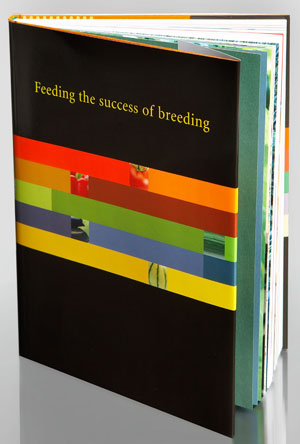Feeding the success of
breeding
Published by De Ruiter Seeds
December 2006
“Vegetables with reliable
flavour result in explosive rise
in turnover”
 Improved
predictions of the quality of
fresh vegetables could probably
allow Dutch producers, traders
and retailers to double their
turnover within the product
group, as well as resulting in
an increase in the consumption
of fresh fruit and vegetables.
This is the view presented in
the jubilee book “Feeding the
success of breeding”
published by the 60-year-old
breeder and producer
De Ruiter Seeds in
Bergschenhoek. The book has been
published in order to provide an
impression of the worldwide
innovations within the
horticultural sector. Improved
predictions of the quality of
fresh vegetables could probably
allow Dutch producers, traders
and retailers to double their
turnover within the product
group, as well as resulting in
an increase in the consumption
of fresh fruit and vegetables.
This is the view presented in
the jubilee book “Feeding the
success of breeding”
published by the 60-year-old
breeder and producer
De Ruiter Seeds in
Bergschenhoek. The book has been
published in order to provide an
impression of the worldwide
innovations within the
horticultural sector.
In the book, De Ruiter Seeds
describes a model developed at
Wageningen University linking
product properties such as
flavour at the moment of
harvesting or supply to the shop
shelves with the behaviour of
consumers. The Wageningen-based
professor of Horticultural
Production Chains, Olaf van
Kooten, had this to say at the
book launch: “Those using the
models will be able to tailor
their product much more
precisely to the demands of the
consumer. The consumer gets a
product that tastes great every
time, for example.” Van Kooten
considers this to be an
important gain, as flavour is
currently an unreliable quality
aspect, and consequently repeat
purchases are not made.
The success of the working
method is demonstrated by the
sales of mangos at Albert Heijn
supermarkets, which set to work
using Van Kooten’s models. “The
ready-to-eat mangos arrive on
the shelves precisely when their
flavour is at its best. They are
50% more expensive than standard
mangos, and sales have
exploded.” According to Van
Kooten, horticultural producers
can learn to work with the model
in the space of one year. In
this way, they can make the
transition from “large
quantities for a low price” to
“much less for a much higher
price”.
In ”Feeding the success of
breeding”, retail specialist
Jan-Willem Grievink advises
companies in the food
horticulture sector to stop
overproduction. “The excess
supply and low levels of
innovation mean that fresh
vegetables rapidly degrade into
a commodity, allowing retailers
to distribute as they please and
thus to control the market.
Increases in scale – which keep
the margin intact - or new
products for top retailers are
tried and tested responses. “New
products and concepts in the
fresh-produce segment constitute
the building blocks for their
formulae. Those who are able to
offer this can actually control
the chain.”
Henk Volberda, professor in
Strategic Enterprise Policy at
the Erasmus University
Rotterdam, also spoke at the
book launch. In the book, he
argues that insufficient use is
often made of technological
innovations. The success of an
innovation is largely due to the
business culture, the internal
collaboration, and the use of
knowledge. On average,
businesses that structurally
invest in knowledge have a 21
per cent higher yield, according
to Volberda. “Through social
innovation, individual
businesses can make better use
of innovations and respond more
effectively to market
requirements. That reinforces
their competitiveness and
benefits their profitability”
says Henk Volberda in
conclusion.
“Feeding the success of
breeding” includes the views
of successful horticultural
producers from the Netherlands,
the UK, Poland, Spain,
Australia, Brazil, Japan, Canada
and the United States, as well
as breeders, scientists and
other specialists. Together,
they explore important
developments within the sector
on the basis of the concepts of
“horticulture, seed improvement,
nutrition, and innovation.”
De Ruiter Seeds breeds,
develops, produces and sells
hybrid vegetable seeds for
top-quality products in
tomatoes, cucumbers, aubergines,
sweet peppers, melons and
rootstocks. The family company,
which started out in 1945, has
grown rapidly over the last ten
years and is characterised by
innovation and increasing
internationalisation. More than
700 people work at the various
branches in the Netherlands
(Bergschenhoek), elsewhere in
Europe, Mexico, Guatemala, the
United States, Israel, Turkey
and Japan.
Individuals interested in
acquiring this book may contact
sales@deruiterseeds.com
|